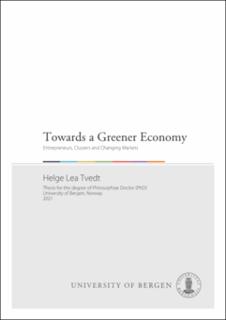| dc.description.abstract | A shift towards a greener economy is inevitable, given the urgency to deal with climate change and other pressing environmental challenges. The aim of the thesis is to contribute to the theoretical and empirical understanding of how, why, and under what circumstances green value creation unfolds. This is done by employing a research design that sees green value creation as a process that both unfolds at multiple level in the corporate sector and is shaped by interactions across the different levels. This multilevel approach is operationalised through studies of green entrepreneurship at the micro-level, cleantech clusters at the meso-level, and market conditions for environmental goods and services at macro-level. The thesis applies a qualitative case study design based on empirical evidence collected over a period of seven years, between 2013 and 2020. The empirical evidence was obtained through methodological triangulation involving interview data, survey data and desk research, mainly from Norway, but also from the United States, Austria, and Ireland.
At the micro-level, the thesis theoretically and empirically takes a close look at green value creation in the form of green entrepreneurship. The analysis reveals how the ‘green’ part of the entrepreneurship is brought into start-up processes and the value it delivers throughout various stages of their establishment. The thesis challenges the stereotypical conception of green entrepreneurship by demonstrating case studies where environmentally sound businesses have risen from rather conventional entrepreneurial endeavours whereby the green value has been created intrinsically through innovative technological designs. The thesis further shows that the green value of the start-ups has played a key role in attracting innovation partners and investors, recruiting personnel, and obtaining public funding. Moreover, the specific characteristics of the spatial and institutional context have had a clear impact on the success of the start-ups by offering unique knowledge bases accompanied by environmental regulations that create market demand.
The meso-level of the thesis explores the formation and structure of cleantech clusters based on three case studies, carried out respectively in the United States, Austria, and Ireland. The findings show that the cleantech clusters are much more diverse with respect to industry composition and actor heterogeneity compared with conventional business clusters (i.e. Porterian business clusters). Moreover, the thesis shows that multiple factors have led to the formation and spatial distribution of the cleantech clusters. At the meso-level, this includes path-dependent processes that form the industrial basis from which cleantech clusters can emerge. However, in the studied cases the industrial potential for cleantech development was largely actualised by deliberate place leadership and various trigger mechanisms that took place at both the micro-level and macro-level. By demonstrating the importance of both micro-level agency and macro-level conditions in cluster formation, the thesis represents a theoretical approach that often has been neglected in conventional analyses of how regional industries emerge and develop.
The macro-level focuses on market conditions by exploring demand mechanisms for environmental goods and services. The thesis shows that green market demand is created by multiple conditions and mechanisms that work together, including costefficiency, environmental and social responsibility, customers’ environmental awareness, CSR strategies, risk-management, regulations, and subsidies. The thesis further demonstrates how market conditions for green products and services may differ across regions and countries, due to different regulatory landscapes and public priorities, but also to other non-regulatory conditions such as the degree of environmental awareness within a market, either geographical or sectoral. The latter informs the literature by explicitly bringing the spatial dimension into discussions on green market demand.
Combined, the three analytical levels deliver insights into how green value is created in the corporate sector (RQ 1), the role of geography in these processes (RQ 2), and how the micro-, meso-, and macro-levels interact in green value creation initiatives (RQ 3). By answering these overarching research questions, the thesis provides new insights that highlight the value of cross-disciplinary thinking with respect to understanding the interplay between actors, systems, and structures involved in green value creation. This particularly concerns the way theoretical triangulation is used actively in the thesis to inform existing theories and concepts within economic geography, but also in the green entrepreneurship literature. | en_US |
| dc.relation.haspart | Article 3: Tvedt, L. H. (2016) Market conditions for sustainable entrepreneurship: A case study of green support services. In: Jones, A., Ström, P., Hermelin, B. & Rusten, G. (eds.) Services and the Green Economy. London. Palgrave McMillan, pp. 125–150. The article is not available in BORA due to publisher restrictions. The published version is available at: <a href=" https://doi.org/10.1057/978-1-137-52710-3_6" target="blank"> https://doi.org/10.1057/978-1-137-52710-3_6</a> | en_US |
